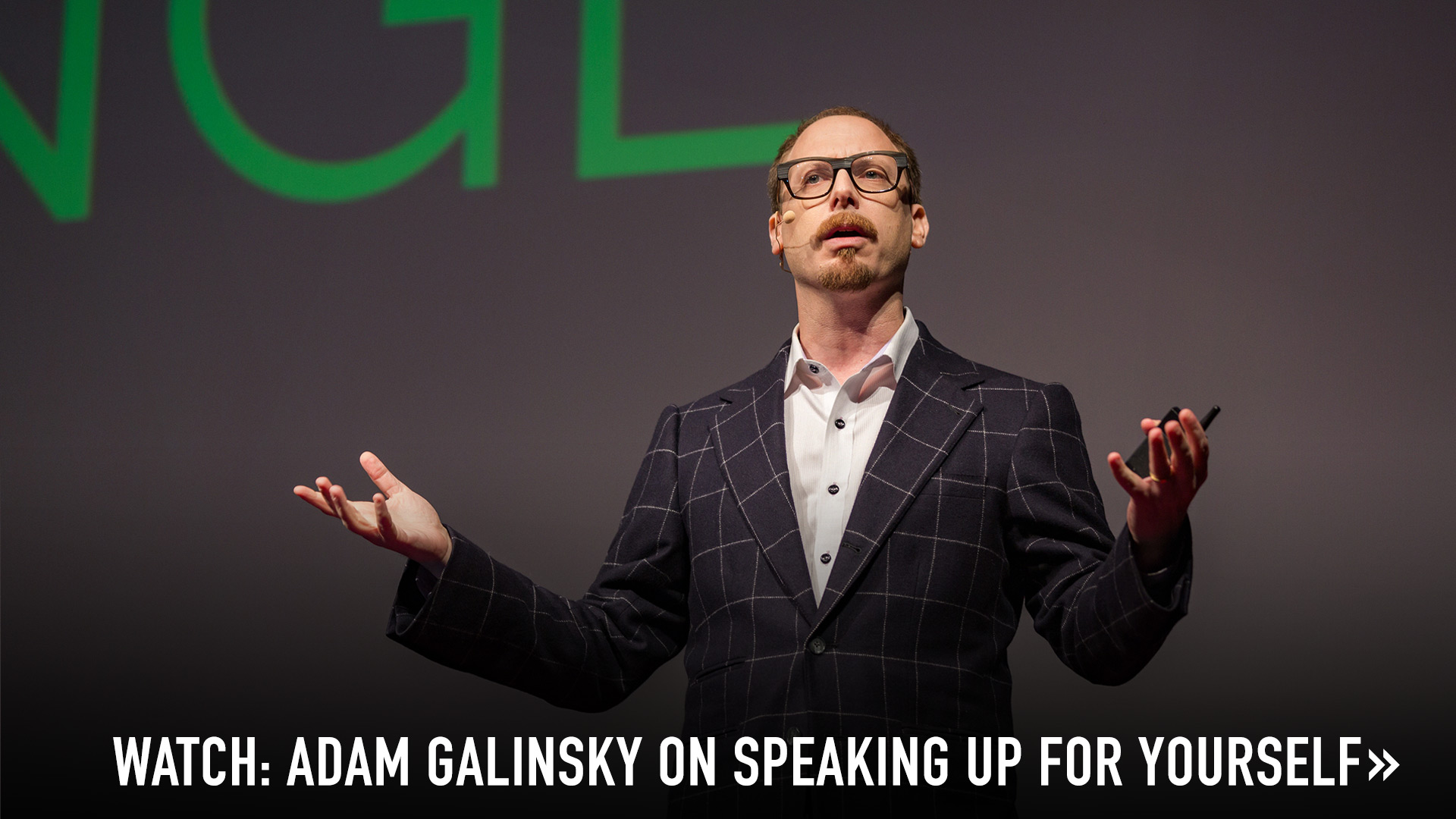
Yes, it’s possible to ask for what you want without coming across as a jerk, says social psychologist Adam Galinsky.
Speaking up is hard to do. I understood the true meaning of this phrase last year, when my wife and I became new parents. After we took our child home from the hospital, we were unsure whether our baby was getting enough nutrients from breastfeeding. We wanted to call our pediatrician, but we also didn’t want to make a bad first impression or come across as crazy, neurotic parents. So we worried and waited. When we took him for a checkup the next day, the doctor said our son was pretty dehydrated and she immediately gave him formula. She also assured us that we could always contact her. But when my wife and I were worrying at home, I should’ve spoken up but I didn’t.
Of course, there are times we speak up when we shouldn’t. I learned that over 10 years ago when I let my twin brother down. He is a documentary filmmaker, and he received an offer for one of his films from a distribution company. He was excited and inclined to accept it. But as a negotiations researcher, I insisted he make a counteroffer, and I helped him craft the perfect one. And it was perfect — perfectly insulting. The company was so offended, they withdrew the offer, and my brother was left with nothing.
In my work, I’ve asked people all over the world how they handle the dilemma of speaking up: when do they feel they can assert themselves, when can they push their interests, when can they express an opinion, when can they make an ambitious ask. Through their anecdotes, I’ve seen that each of us has what’s called a range of acceptable behavior. Sometimes we may come across too strong; we push ourselves too much. That’s what happened with my brother — making a counteroffer was outside his range of acceptable behavior. When we step outside our range, we usually get punished in a variety of ways. We get dismissed, demeaned, even ostracized. Or we lose that raise, promotion or deal we were asking for.
You can start by asking yourself: “What is my range?” The key thing is, our range isn’t fixed. It’s dynamic, expanding or narrowing based on the context you’re in. However, one thing determines your range more than anything else: your power. Power comes in many forms. In negotiations, it comes in the form of alternatives. My brother had no alternatives, so he lacked power. At the same time, the distribution company had lots of alternatives, so they had power. When we have lots of power, our range is very wide and we have a lot of leeway in how to behave. But when we lack power, our range narrows and we have little leeway. The problem is, when our range narrows, it produces something called the low-power double bind: if we don’t speak up, we go unnoticed, but if we do speak up, we get punished.
In order to feel comfortable speaking up and to get what we want, we need ways to expand our range of power. In our work, my colleagues and I have found two things that really matter: 1) You feel powerful in your own eyes; 2) You feel powerful in the eyes of others. When you feel powerful, you feel confident and not fearful, and you can expand your own range. When other people see you as powerful, they grant you a wider range. So we should find and use tools that help expand our range of acceptable behavior.
The first tool — which is sometimes called “the mama bear effect” — was discovered in negotiations through an important finding. On average, at the bargaining table women make less ambitious offers and get worse outcomes than men. However, negotiation researchers Hannah Riley Bowles and Emily Amanatullah both discovered there is one situation where women receive the same outcomes as men and are just as ambitious — when they advocate for others. When they do, they expand their range in their own minds and become more assertive. Like a mama bear defending her cubs, when we advocate for others, we can discover our own voice.
Often, though, we need to be able to advocate for ourselves. In that case, one of the most important tools we have is called perspective-taking. It’s really simple — just look at the world through the eyes of another person — and it’s one of the most important tools we have to expand our range. When I take your perspective and think about what you really want, you are more likely to give me what I want.
Here’s a true story that exemplifies this approach. A man walked into a bank in Watsonville, California. He said, “Give me $2,000, or I’m blowing the whole bank up with a bomb.” The bank manager didn’t just hand him the money. Instead, she took his perspective and noticed something really important — he’d asked for a specific amount of money. She said, “Why did you ask for $2,000?” He answered, “My friend is going to be evicted unless I get him $2,000.” She replied, “Oh! You don’t want to rob the bank. You want to take out a loan. Why don’t you come back to my office, and we can have you fill out the paperwork?” Her quick perspective-taking defused a volatile situation. Taking someone’s perspective allows us to be ambitious and assertive, but still be likable.
There’s another way to be assertive and still be likable: signal your flexibility. Imagine that you work at a car dealership, and you want to sell someone a car. You’re more likely to make the sale if you give your customer two options; let’s say option A is a price of $24,000 and a five-year warranty, and option B is a $23,000 price and a three-year warranty. My research shows when you give people a choice of options, it lowers their defenses, and they’re more likely to accept your offer.
This doesn’t only work for salespeople — it can work for parents. When my niece was four, she resisted getting dressed and rejected the outfits her mother pulled out for her. But then my sister-in-law had a brilliant idea: What if she gave her daughter a choice of shirts, pants or dresses? It worked brilliantly — my niece made her choice and then got dressed quickly and without resistance.
I’ve asked people around the world “When do you feel comfortable speaking up?” The number one answer has been “when I have social support.” So it helps us to get allies on our side. One way to do that is to be a mama bear. Another way to earn strong allies, especially in high places, is to ask for advice. When we ask for input, people like us because we’re flattering them and expressing humility. What’s more, it solves another double bind. Known as the self-promotion double bind, it’s where if we don’t advertise our accomplishments, no one notices; and if we do, we’re not likable.
But when we ask for advice in reference to one of our accomplishments, we’re seen as competent in other people’s eyes — and also likable. This strategy is so powerful it works even when you see it coming. Multiple times in my life, I’ve been forewarned that a low-power person has been instructed to ask me for advice. Each time, I took their perspective, I became more invested in their cause, and I became more committed to them because they asked me for advice.
Another time we feel more confident speaking up is when we have expertise. Expertise gives us credibility. When we have high power, we already have credibility — we only need good evidence. But when we lack power, we don’t have credibility — and we need excellent evidence. We can come across as an expert by tapping into a passion. When we tap into our passion, we give ourselves the courage in our own eyes to speak up, and we get permission from others to speak up, too. Tapping into our passion works when we come across as too weak. Both men and women are frequently punished in the workplace when they shed tears. But researcher Elizabeth Baily Wolf has shown that when we’re able to frame our strong emotions as passion, the condemnation of crying disappears for both men and women.
While all of us have been assigned ranges and roles in this world, these roles and ranges are constantly expanding and evolving. So depending on the scenario, be a ferocious mama bear or a humble advice seeker. Have excellent evidence and strong allies. Be a passionate perspective taker. When you use these tools — and anyone can use them — you’ll expand your range of acceptable behavior, and you’ll always be able to speak up.












